Peter Walker
Student Number: 514508
Introduction to Film Culture: Assignment 2
Reflection on cinema has explored and expressed contemporary social and moral attitudes over the years.
The sex runs through all lives; it is fundamental to existence as species, and it underpins almost every aspect of human society. What is unique to humans is their morality and sensibilities about sex, and therefore the concept of love and lust is born.
In this essay I look to illustrate how film makers have worked with this morality in relecting the issues of the day.
Brief Encounter Dir David Lean 1945
Brief Encounter released immediately after the second world war, it is a story of the doomed love that grows between housewife Laura Jesson and Dr Alec Harvey after a chance meeting in a railway station café.
Britain of 1945 was moral on the surface were to repress desire that was still a level of “Victorian type values”, but the country had just emerged from 6 years of war and hardship. People lives had changed significantly as the war touched them, either with the sudden death of a loved one or close friend, because you thrust into new situation either as a soldier or as for woman thrown into working in factories and farms. The underlying nature of people was changing but not always on the surface.
The director David Lean and writer Noel Coward with Brief Encounter explores that morality by show a story of an unconsummated love affair conducted by too decent married people who at their heart are conflicted by their feelings. David Thompson is his 2010 Top Ten romantic film alludes that the sedateness of this movie is out of step with the films of the day which their the lust and desire; all with the Hays Code of course, but Brief Encounter is more about a dream of romance.
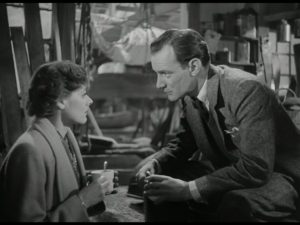
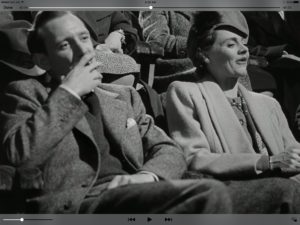
The screen shots illustrate that they the relationship between Laura and Alec is very much like that of a teenage school romance; dates in the pictures and the sheer pleasure in the faces that they are just in each other company. There is quietness about Noel Cowards script there is no symbolism required to get around the Hays Code; the couple never has sex. There is a more open affair happen on the fringes of the film with the flirting between that station guard and café manageress.
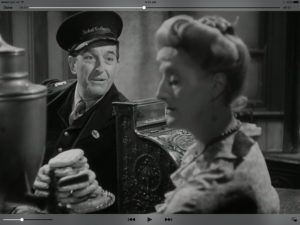
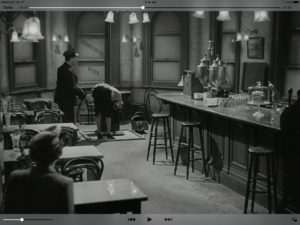
This could be Coward’s way of reflection on his personal life. Coward was very private about his homosexuality throughout his life, whereas in contrast the director David Lean was married many times. Could it be that Coward was writing a parable for a gay relationship in post-war Britain, not just the extramarital affair?
Although, throughout the film, it is evident the couple are disenchanted with you current relationship it does not go into the reason why. We are given a glimpse into Laura’s home life, which seems to perfectly reasonable. The film gives no reason why we should will these too to leave their respective partners which play to the morals of the days and the depiction of Laura with the eye look of an adoring teen help keep the film firmly grounded in the outward morals of the day.
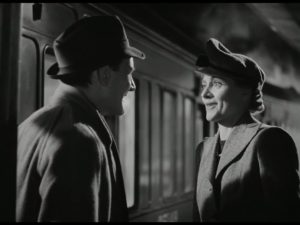
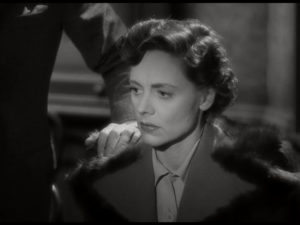
Laura and Alec part at the end of the movie choosing to remain on their current paths although they have clearly fallen deeply in love with each other. The love unrequited and again morals are kept by now allowing the farewell to get too emotional, they final cup of tea is disturbed by an acquaintance and Alec departs with a tap on the shoulder and Laura returning to embrace we husband for being far away.
Breakfast at Tiffany’s Dir Blake Edwards 1960
Based on a novella by Truman Capote tells the love story of Holly and Paul, one an escort and the other the “kept man” of an older married woman.
The film in contrast to the book does not overtly mention that Holly is a prostitute and removes all trace of the pregnancy with Jose’s child and end with the Paul and Holly being together. Morality had changed by 1960 for the baby boomers, not their parents nor the Hayes Code, so these changes were necessary to deal with the mixed morality of the time.
The film employs use of symbolism in the dialogue to lead the audience on a journey to the real mean should they wish to follow it
For example:
“I always get $50 for the powder room” – Holly explains what happens on her dinner dates
“Well is she or isn’t she? Is she or isn’t she….. a phoney?” OJ Berman and Paul discussing
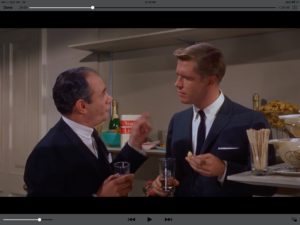
Moreover, below “Do you think she handsomely paid? If had her money I would be richer than she is …” Discussing the stripper breasts and how they would change here life as an escort.
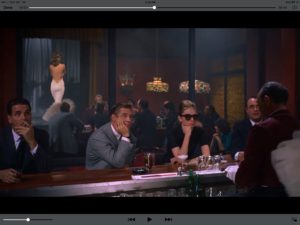
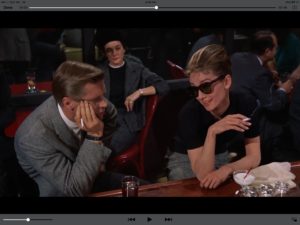
Although she is clearly an escort, the film gives innocence to Holly and allow in contrast to Brief Encounter provides an insight into her background which while not normal like Laura it is not too hard and shown that she still cares for the people she has left behind in the scene below.
The film as a whole is beautiful to watch; the mise en scene is a delight to the eyes. From the opening scene of the taxi pulling up at Tiffany’s; combine with the one-sided love story from the eyes of Paul how no matter what happens he loves Holly cleverly distract the audience from the underlying story of a “golddigger.” It ends with a scene of high emotion when Paul explain to Holly that she is architect of here own troubles and she should let him into her life which brings the story back to an excellent moral conclusion
Breathless Dir Jean- Luc Goodard 1961
Also released in the early 1960’s Jean-Luc Goddard Breathless deal with love and lust much more directly. Freed from the constrains of the Hollywood system and the Hayes Code Goddard was able to produce a film that gives no excuse for its protagonist’s actions.
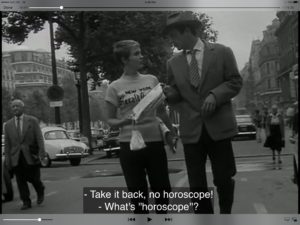
Michel (Jean-Paul Belmondo) is without redeeming features; he steels from his girlfriend while she is distracted; he ignores Patricia (Jean Seberg) while reading a pinup magazine, and for no reason kills a motorcycle policeman.
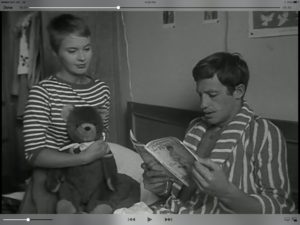

Patricia is also amoral she is living a bohemian lifestyle, happy to have a casual relationship with Michel and others. Goddard has not used symbolism to reflect the morality; he is showing it in a very raw way.
Using the mobile camera that was the hallmark of the new wave, the film has the fly on the wall or documentary-style look. The mise en scene and editing are much different to the previous films like the morality it shows it much rawer.
There is some symbolism; although Michel always pesters Patrica for sex, there are no overt sex scenes. The camera does cut away at an appropriate time.
Comparing Breathless and Breakfast at Tiffany’s as contemporaries, Breathless addresses the issues of the day more directly. Breakfast at Tiffanys is flawed in the fact that is disguised the issues in Hollywood wrapping i.e. the beautiful set pieces and happy ending love story.
Moreover, of the three again Breakfast at Tiffany’s is the weakest at dealing with the social issues of the day, although credit is due to bring these matters to the screen if heavily masked, while for all it repression Brief Encounter is reflecting a situation that is still as relevant today as it was them.
Bibliography
pangeaprogressredux (2012) Professor Dreyfus lecture – breathless (À bout de souffle) active & passive nihilism. Available at: https://www.youtube.com/watch?v=th52fhMlsDA (Accessed: 20 September 2016).
Thomson, D. (2009) Have you seen? A personal introduction to 1, 000 films including masterpieces, oddities and guilty pleasures (with just a few disasters). London: Penguin Group UK.
Thomson, D. (2010) Brief encounter: The best romantic film of all time. Available at: https://www.theguardian.com/film/2010/oct/16/brief-encounter-romance (Accessed: 21 September 2016).
